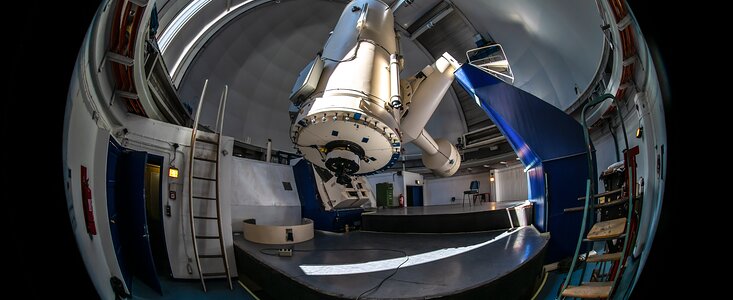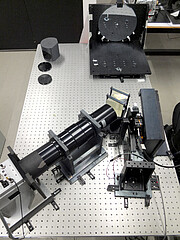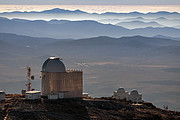Announcement
PLATO Spec, the new instrument at ESO’s La Silla Observatory is now ready for exoplanet research
16 December 2024
Twenty years after its decommissioning, the ESO 1.52-m telescope hosted at our La Silla Observatory in Chile, has been given new life. Its brand-new PLATO Spec instrument, a high-resolution spectrograph developed by a consortium led by the Czech Academy of Sciences, has now seen first light. The 50-year-old telescope was refurbished in 2022 and, with this new instrument, it’s now ready to make new cutting-edge astronomical discoveries.
PLATO Spec, which will conduct observations in visible light, has been designed to screen stars with potential exoplanets — planets orbiting stars other than the Sun. The instrument will help find the most promising stars hosting exoplanet candidates by detecting changes in the host star’s light, as it wobbles due to the planet’s gravitational pull. It is so precise that it will be able to detect changes on a star’s velocity down to just 3 m/s, which is equivalent to a person running at modest speed.
The project was developed by the PLATO Spec Consortium, which includes the Astronomical Institute of the Czech Academy of Sciences (responsible for the telescope modernisation and front end), the German Thuringian State Observatory Tautenburg (calibration unit), the Pontificia Universidad Católica de Chile (spectrograph), the Chilean Universidad Adolfo Ibañez (data processing and pipeline), as well as other strategic partners. As part of this project, the ESO 1.52-m telescope, which had not been in use since 2003, has been modernised with a top-of-the-line instrument that can be operated remotely.
The spectrograph will assist space-based observatories in their search for exoplanets, including the European Space Agency’s current PLATO and future ARIEL missions. PLATO Spec will be able to confirm their potential detections of exoplanets the size of Jupiter to Neptune and study their atmospheres. Its observations will also help better understand the physics and movement of stars, in particular to measure the activity level of a star and how it changes over time.
The consortium will be responsible for 90% of the telescope’s time, with 10% of observations allocated to Chile-based astronomers. After a proprietary period, all data will be made available to the scientific community through the ESO Science archive.
More Information
The project is partially funded by the Chilean National Agency for Research and Development (ANID).
Links
Contacts
Petr Kabáth
PLATO Spec Principal Investigator, Astronomical Institute of the Czech Academy of Sciences
Ondřejov, Czechia
Email: kabath@asu.cas.cz
Artie Hatzes
PLATO Spec Team Member, Thuringian State Observatory Tautenburg
Tautenburg, Germany
E-Mail: artie@tls-tautenburg.de
Leonardo Vanzi
PLATO Spec Team Member, Pontificia Universidad Católica de Chile
Santiago, Chile
E-Mail: lvanzi@uc.cl
Bárbara Ferreira
ESO Media Manager
Garching bei München, Germany
Tel: +49 89 3200 6670
Email: press@eso.org
About the Announcement
| Id: | ann24019 |
Our use of Cookies
We use cookies that are essential for accessing our websites and using our services. We also use cookies to analyse, measure and improve our websites’ performance, to enable content sharing via social media and to display media content hosted on third-party platforms.
ESO Cookies Policy
The European Organisation for Astronomical Research in the Southern Hemisphere (ESO) is the pre-eminent intergovernmental science and technology organisation in astronomy. It carries out an ambitious programme focused on the design, construction and operation of powerful ground-based observing facilities for astronomy.
This Cookies Policy is intended to provide clarity by outlining the cookies used on the ESO public websites, their functions, the options you have for controlling them, and the ways you can contact us for additional details.
What are cookies?
Cookies are small pieces of data stored on your device by websites you visit. They serve various purposes, such as remembering login credentials and preferences and enhance your browsing experience.
Categories of cookies we use
Essential cookies (always active): These cookies are strictly necessary for the proper functioning of our website. Without these cookies, the website cannot operate correctly, and certain services, such as logging in or accessing secure areas, may not be available; because they are essential for the website’s operation, they cannot be disabled.
Functional Cookies: These cookies enhance your browsing experience by enabling additional features and personalization, such as remembering your preferences and settings. While not strictly necessary for the website to function, they improve usability and convenience; these cookies are only placed if you provide your consent.
Analytics cookies: These cookies collect information about how visitors interact with our website, such as which pages are visited most often and how users navigate the site. This data helps us improve website performance, optimize content, and enhance the user experience; these cookies are only placed if you provide your consent. We use the following analytics cookies.
Matomo Cookies:
This website uses Matomo (formerly Piwik), an open source software which enables the statistical analysis of website visits. Matomo uses cookies (text files) which are saved on your computer and which allow us to analyze how you use our website. The website user information generated by the cookies will only be saved on the servers of our IT Department. We use this information to analyze www.eso.org visits and to prepare reports on website activities. These data will not be disclosed to third parties.
On behalf of ESO, Matomo will use this information for the purpose of evaluating your use of the website, compiling reports on website activity and providing other services relating to website activity and internet usage.
Matomo cookies settings:
Additional Third-party cookies on ESO websites: some of our pages display content from external providers, e.g. YouTube.
Such third-party services are outside of ESO control and may, at any time, change their terms of service, use of cookies, etc.
YouTube: Some videos on the ESO website are embedded from ESO’s official YouTube channel. We have enabled YouTube’s privacy-enhanced mode, meaning that no cookies are set unless the user actively clicks on the video to play it. Additionally, in this mode, YouTube does not store any personally identifiable cookie data for embedded video playbacks. For more details, please refer to YouTube’s embedding videos information page.
Cookies can also be classified based on the following elements.
Regarding the domain, there are:
- First-party cookies, set by the website you are currently visiting. They are stored by the same domain that you are browsing and are used to enhance your experience on that site;
- Third-party cookies, set by a domain other than the one you are currently visiting.
As for their duration, cookies can be:
- Browser-session cookies, which are deleted when the user closes the browser;
- Stored cookies, which stay on the user's device for a predetermined period of time.
How to manage cookies
Cookie settings: You can modify your cookie choices for the ESO webpages at any time by clicking on the link Cookie settings at the bottom of any page.
In your browser: If you wish to delete cookies or instruct your browser to delete or block cookies by default, please visit the help pages of your browser:
Please be aware that if you delete or decline cookies, certain functionalities of our website may be not be available and your browsing experience may be affected.
You can set most browsers to prevent any cookies being placed on your device, but you may then have to manually adjust some preferences every time you visit a site/page. And some services and functionalities may not work properly at all (e.g. profile logging-in, shop check out).
Updates to the ESO Cookies Policy
The ESO Cookies Policy may be subject to future updates, which will be made available on this page.
Additional information
For any queries related to cookies, please contact: pdprATesoDOTorg.
As ESO public webpages are managed by our Department of Communication, your questions will be dealt with the support of the said Department.



